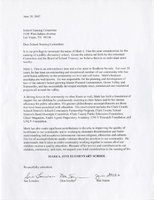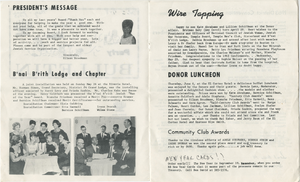Search the Special Collections and Archives Portal
Search Results

Transcript of interview with Irene Fisher and Roberta Gang by Barbara Tabach, September 29, 2016
Date
Archival Collection
Description
Las Vegas has been home to Irene Fisher (1940 - ) since the early 1970s. It felt like home as she connected with the Jewish community, including a dear friendship with Roberta ‘Bobbie’ Gang, who sits with her during this interview. During their oral history conversation, the seemingly common concerns of any mother are touched upon. In their case they were young Jewish women looking out for the well-being of their children. They cover a range of topics, from b’nai mitzvahs to Hanukkah to shopping in those years of raising children, being active in the community, and maintaining career paths. Irene begins by describing her ancestral background that includes parents who emigrated from Poland to New York. In New York she met and married a young doctor who she followed to Nellis Air Force Base. Irene was a recent graduate of Brooklyn Law School. In Las Vegas, though Irene did not practice law here, she immersed herself into civic contributions. Chief among those was with the Clark County
Text

Angela Castro oral history interview: transcript
Date
Archival Collection
Description
Oral history interview with Angela Castro conducted by Stefani Evans, Cecilia Winchell, Kristel Peralta, Vanessa Concepcion, and Ayrton Yamaguchi on November 05, 2020 for the Reflections: The Las Vegas Asian American and Pacific Islander Oral History Project. Castro begins the interview by talking about her early life, childhood, what Guam was like, and the history of her parents and grandparents. She describes the difference in public and private education in Guam and compares it to the United States. She explains the reason why she moved to Las Vegas, Nevada in 1998 and attended the University of Nevada, Las Vegas for public relations. Castro then talks about the differences between older and newer generations, the political atmosphere in Guam, and the differences between the United States and Guam in politics. She also talks about the discrimination she has experienced throughout her life and diversity in the workplace. Lastly, she describes her culture and traditions during holidays, the struggles with an absence of culture within her family, and her personal religious beliefs.
Text

Interview with Peter Ediger, June 24, 2005
Date
Archival Collection
Description
Text

Application and supporting documents for the naming of Mark L. Fine Elementary School, 2007
Date
Archival Collection
Description
The application and supporting documents provide details about Mark Fine and his contributions to Clark County and Las Vegas, Nevada. There are letters of support from many members of the community, including his children and elected officials, and from leaders in religious groups, non-profit organizations and business enterprises.
Text

Luis F. Valera interview, January 23, 2019: transcript
Date
Archival Collection
Description
Interviewed by Nathalie Martinez. Laurents Bañuelos-Benitez also participates in the questioning. Luis F. Valera serves as the Vice President of Government Affairs at UNLV. His heritage is from Venezuela and Cuba. He has served as the Chairman of the Latin Chamber of Commerce and has been an active member of the Latino community since his pursuing his undergraduate degree at UNLV in Political Science and his Juris Doctorate degree from the William S. Boyd School of Law. His various achievements in the community and nation led him to become recognized and awarded the Arturo Cambeiro Hispanic of the Year Award in 2011.
Text

Transcript of interview with Kate Hausbeck Korgan by Claytee White, February 3, 2010
Date
Archival Collection
Description
Kate Hausbeck Korgan was raised and educated in Buffalo, New York. In 1995, after receiving her doctorate in sociology from University of Buffalo, her job search brought her to the University of Nevada, Las Vegas. It was a great fit and she tells of falling in love with the school, the city, and the John S Park Neighborhood. Kate retells the story of the house where she and her family reside. It's original owners were the Gambles who built the house in 1936. It was the second house built in the neighborhood and is the only inhabited adobe house in the city. The house is located on the fringe of John S. Park Neighborhood, about a block off the Strip. Though the location creates traffic that she doesn't like, it is not enough to cause her to move. She describes the newer generation of residents and the changes as the number of school aged children increased. Kate's perspective includes what she describes as the ebb and flow of the community, the beginning of First Fridays, the
Text

Edith Leavitt interview, February 7, 1977: transcript
Date
Archival Collection
Description
On February 7, 1977, collector Enrico Messina interviewed Edith Leavitt (born April 12th, 1924, in St. George, Utah) at her home in Las Vegas, Nevada. In this interview, Mrs. Leavitt talks about teaching in Southern Nevada, including in the Virgin Valley and in Las Vegas. She also discusses the changing education system in Southern Nevada during her time as an educator.
Text

